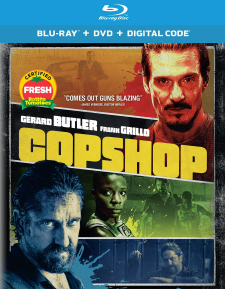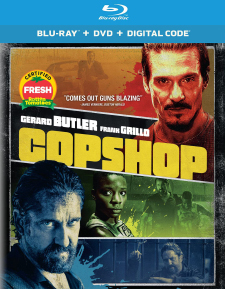Copshop (Blu-ray Review)

Director
Joe CarnahanRelease Date(s)
2021 (December 7, 2021)Studio(s)
Open Road Films (Universal Pictures Home Entertainment)- Film/Program Grade: B-
- Video Grade: A-
- Audio Grade: A-
- Extras Grade: F
Review
Some directors quietly absorb their influences; others openly wear them on their sleeves. Joe Carnahan gleefully flings them at the audience with both hands. During the pre-credit sequence for Copshop, he has one of the characters proudly sporting a Ruger Blackhawk, and while isn’t clear whether or not the gun is actually .44 caliber, there’s little doubt what Carnahan has in mind. Any remaining doubts are erased when the credits roll, and they’re set to Lalo Schifrin’s classic title theme from Magnum Force. Carnahan’s muscular brand of action has often taken its cue from classic Clint Eastwood thrillers of the Seventies and Eighties, so it was inevitable that he would end up borrowing musical cues as well.
The screenplay for Copshop was written by Carnahan and Kurt McLeod, based on a story by McLeod and Mark Williams. It’s essentially a siege story set in a police station, in the mold of John Carpenter’s Assault on Precinct 13. (That film was itself inspired by the Howard Hawks film Rio Bravo, so the great cycle of influences continues unabated to this day.) Gerard Butler and Frank Grillo play two seemingly unrelated individuals who both end up thrown into a small-town Nevada jail. Naturally, there’s more going on with the two of them than meets the eye, and when the entire police station ends up in the crosshairs of the mob, a rookie cop (Alexis Louder) ends up caught in the middle. Various twists and turns ensue.
There’s nothing particularly novel about Copshop, and those twists are pretty familiar, but that’s not the point of the film anyway. Copshop is all about the attitude that Carnahan, his cast, and his crew bring to the proceedings. It’s the kind of film that tries to carry itself on style alone, and for the most part it succeeds at doing so. It’s well-shot and edited, with competently staged (if implausible) action scenes. The score by Clinton Shorter follows through on the borrowed theme from Magnum Force by aping Schifrin for the rest of the film. It even utilizes the revved up two-note rhythm from the latter part of Scorpio’s theme in Dirty Harry—although that rhythm was borrowed from Immigrant Song, and would be borrowed again by John Carpenter for his title theme from Assault on Precinct 13. When it comes to influences, it’s hard to tell the chickens from the eggs.
The most interesting thing about Copshop is how thoroughly the two nominal stars are overshadowed by Alexis Louder. Frank Grillo served as a producer on the film, and he loudly complained that it was taken away from Carnahan and re-edited in a manner which was detrimental to his own performance. That may well be true, but it’s hard to imagine any cut in which Grillo isn’t completely owned by Louder. Carnahan groomed her for the film by asking her to watch Clint Eastwood movies in preparation for her role, and she took those lessons to heart. It’s a star-making performance, or at least it would have been had the film not died a quick death at the pandemic box office. Hopefully she gets another chance to have her day in the sun.
Cinematographer Juan Miguel Azpiroz (aka Juanmi) captured Copshop digitally at 2.8K resolution using Alexi Mini cameras with spherical Panavision Primo Close Focus lenses. The film was shot full frame and cropped to the 2.39:1 aspect ratio for its theatrical release, with the color grading for the final 2K Digital Intermediate performed by Nicholas Hasson at Light Iron in Los Angeles. The resulting image on Universal’s Blu-ray release is sharp, nicely detailed, and immaculately clean. The cinematography exhibits strong contrast and deep black levels, though there’s just a touch of black crush in the darkest areas of the screen in this SDR presentation. (This is one case where it would be interesting to see what kind of improvements that HDR could have provided on an Ultra HD release.) The contrast range is enhanced by the orange/teal color palette, which gives everything a strikingly vivid look. The colors are well-saturated throughout the film, and combined with the sharp contrast, it gives it a heightened sense of reality that does justice to the larger-than-life nature of the story.
Primary audio is offered in English 5.1 DTS-HD Master Audio, with a Descriptive Video Service track included, as well as optional English SDH and Spanish subtitles. While an object-based Dolby Atmos or DTS:X mix would have been nice, this is still a lively 5.1 track, with plenty of directionality. Bullets, broken glass, and much more fly all around the viewer during the action scenes. There’s strong dynamic impact during those moments, and also some very deep bass at key points throughout the film, particularly in Clinton Shorter’s score. It’s not a subtle mix, but then again, it’s not a subtle film.
Universal’s Blu-ray release of Copshop is a 2-Disc set which includes a DVD copy of the film, a Digital code on a paper insert, and a slipcover. That’s it. Aside from some forced trailers up front, not a single extra is included.
Copshop may not break new ground, but it’s still entertaining, and the entire film is worth watching for Louder’s performance alone. It’s a shame that Universal has only given it a rather perfunctory bare-bones release, and while a UHD would have been preferable, this is still a good-looking Blu-ray.
- Stephen Bjork
(You can follow Stephen on social media at these links: Twitter and Facebook.)

